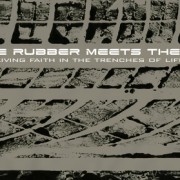On Course as an Acts Church
Last week in our elder’s meeting one of our pastors posed the question, “Do you think all the churches in our area are dealing with the same kinds of opposition and crazy issues we are?” He was referencing the intense nature of both the blessings and buffetings our church and pastoral team seem to be receiving these days. We know that the spiritual war is always real, but there truly are seasons in which it feels more tangible and fierce. In some ways we feel like we are in that kind of season right now.
But as we thought about my friend’s question we believe the Holy Spirit reminded us that whether or not our experience as a church parallels the experience of other Christ-professing churches in the area isn’t what’s important to discern. The important thing to discern is whether or not our experience as a church parallels the experiences of the church in the book of Acts. The important thing to discern is whether or not the ministry dynamics displayed in Christ’s life in the gospels continues on in the body life of our local church. Only when those things are true can we be sure that we’re pursuing what God actually has for us as believers.
I believe we can discern a three-fold pattern that unfolds when Jesus is at work in our midst by looking at the gospels and Acts. You could call these “The Three O’s of the Acts Church” if you’re a cool seeker pastor, but I’m not, so I won’t. 🙂
But here’s what I want to see in our church because I see it in the life of Christ in the gospels and continuing in the life of the early church in Acts:
1. Outpouring of the Holy Spirit
The first part of the process is the outpouring of the Holy Spirit. Jesus heals, saves, and transforms somebody physically or spiritually by His grace and power. This often occurs both in the gospels through Christ directly, and in Acts through Christ indirectly through the agents of His people. People get set free from the power or sin, satan, demons, death and hell.
2. Opposition from the Enemy
The second part of the process is reactionary to the first. In it, the spiritual enemies of God and His people bring opposition to the outpouring of the Holy Spirit. One example of this is depicted in Acts 3 and 4. In Acts 3 Peter and John experience an outpouring of the Spirit as God heals a lame man through them and gives Peter a subsequent opportunity to preach the gospel in light of the miracle. And while some worshiped God in light of the miracle and the gospel, the sadducees and religious people didn’t. They threw them in jail, persecuted them, and put them on trial (4:1-22).
3. Opportunity for Redemption
And yet, God didn’t let that bring discouragement to His people or thwart the work of the gospel. Instead, He used the opposition they faced due to the outpouring of the Holy Spirit and seized it as an opportunity for redemption. He used the testimony of the apostles and God’s work of salvation, preservation, and healing accomplished through and in spite of the opposition to produce worship, unity, compassion, and boldness amongst His people (4:23-37).
So these are the three things we’re looking for at Refuge to make sure the life of Jesus and ministry of the early church is continuing in our midst. Are we experiencing the outpouring of the Holy Spirit? Is that outpouring being met with opposition from the enemy? Is that opposition being hijacked by God and transformed into an opportunity for redemption? If so, we’re content we’re on the right track no matter what’s going on in the midst of other Christ-professing churches around us.
Sound Off
What would you add or take away from the things noted above that demonstrate the work, power, and presence of Jesus in a local church?










